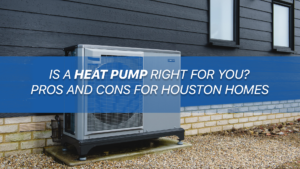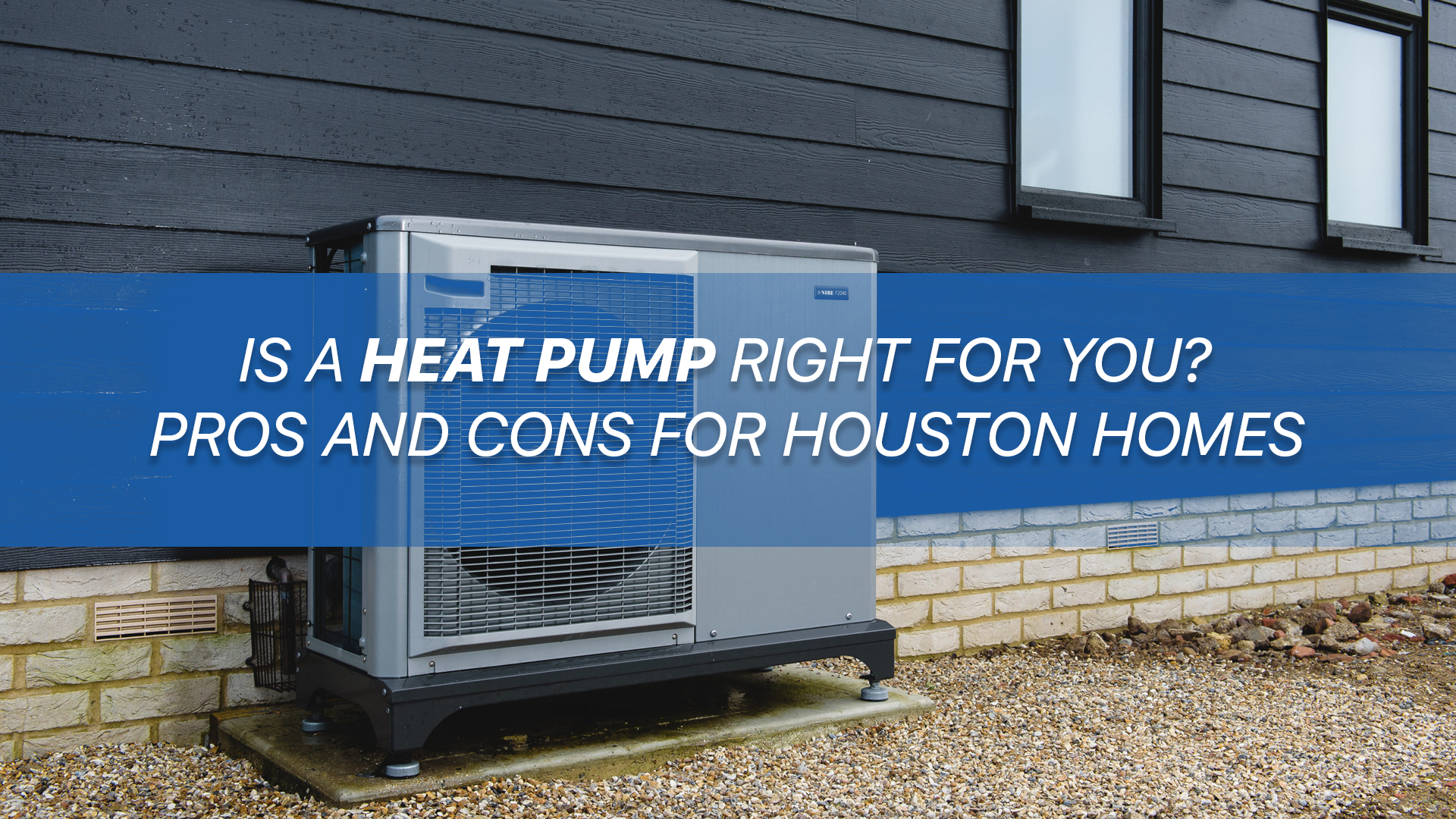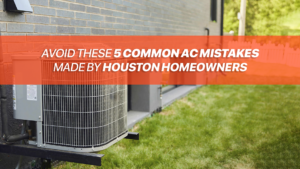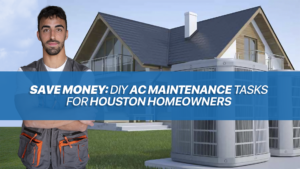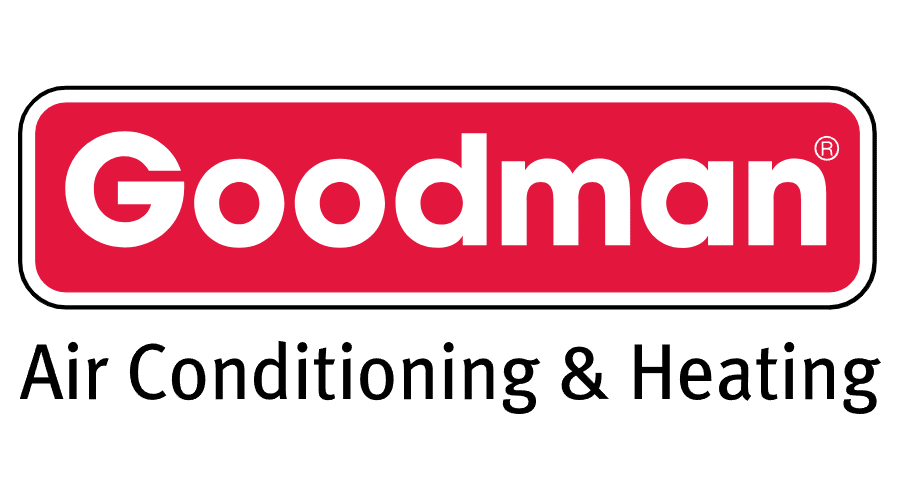As a Houston homeowner, you know that having a reliable and efficient air conditioning system is crucial for maintaining a comfortable indoor climate during the sweltering summers. With temperatures frequently exceeding 100°F and high humidity levels, keeping your home cool can also get expensive with high electricity bills. This is why more Houstonians are considering heat pumps as an alternative to traditional air conditioners. Heat pumps can provide both heating and cooling in one energy-efficient system. However, they aren’t the best solution for every home. To help you decide if a heat pump is right for your Houston home, heres an in-depth look at the key pros and cons to weigh:
How Does a Heat Pump Work?
Before diving into the specific benefits and drawbacks, lets quickly cover the basics of how heat pumps work. The system relies on the compression and expansion of refrigerant to absorb or release heat. This allows it to provide both heating and air conditioning in a single system.
Heres a quick overview of its heating and cooling modes:
Heating Mode
To provide heat, the indoor coil absorbs warmth from outdoor air and transfers it indoors through the refrigerant. The compressor and condenser help concentrate the heat so it can be pumped throughout your home.
Cooling Mode
In cooling mode, the process is reversed. The outdoor coil absorbs heat from indoor air. The refrigerant carries this heat outside, where the condenser and compressor release it outdoors. This leaves cooled air to be circulated indoors. Now lets look at the potential benefits and downsides of installing a heat pump in your Houston home.
Pros of Heat Pump for Houston Homes
There are several reasons why they have been growing in popularity in the Houston area.
1. Year-Round Comfort in One System
Unlike a traditional air conditioner that only cools, a heat pump provides air conditioning in the summer and heat during Houston’s brief winter seasons. This allows you to enjoy comfortable temperatures year-round without needing separate A/C and heating systems. Having just one system to maintain and service is much more convenient and can lead to cost savings over time.
2. Greater Energy Efficiency
Heat pumps can be significantly more energy efficient than other types of HVAC systems. While an AC unit’s efficiency is rated by SEER (Seasonal Energy Efficiency Ratio), heat pumps are rated by HSPF (Heating Seasonal Performance Factor). The most high-efficiency heat pumps today have SEER ratings over 20 and HSPF ratings of 10 or greater. This is much better than the minimum ratings of 13 SEER and 7.7 HSPF. With these high-efficiency units, you can cut your energy costs by as much as 30% compared to conventional separate systems. This savings adds up quickly during Houston’s long summers and mild winters.
3. Potential Rebates and Tax Credits
Due to their energy efficiency, heat pumps qualify for various rebates and tax credits that can offset their higher upfront costs. For example, CenterPoint Energy offers a $1,500 rebate for installing an ENERGY STAR certified heat pump with a SEER of at least 16. The system must be installed by a certified contractor. On the federal level, highly efficient heat pumps qualify for a tax credit of up to $500. So be sure to explore any incentives available in your area.
4. Effective Humidity Control
Houstons muggy climate means dealing with high humidity inside your home. Heat pumps are excellent at removing excess moisture from indoor air during the hot, humid summers. They can lower indoor humidity levels to around 40-50%. This prevents mold and mildew growth and that sticky feeling inside your home.
5. Quieter Operation
Todays variable-speed heat pumps operate much more quietly than older single-stage models. This is especially true when they run at lower speeds to maintain your desired temperature. Quieter performance is a major plus for bedrooms, living spaces, and other areas where noise can be disruptive. Just be sure the outdoor unit is positioned away from windows and patios.
6. Advanced Smart Features
Top-tier ones come with smart features like WiFi connectivity, apps, voice control integration, and advanced sensors. This allows you to closely monitor energy use and customize operation for greater efficiency. Smart functions also provide convenience, like adjusting temperatures remotely or creating schedules and modes tailored to your households needs.
Potential Downsides of a Heat Pump for Houston Homes
While heat pumps have some clear benefits, they also come with a few drawbacks to keep in mind:
1. Higher Upfront Costs
The initial purchase and installation cost for a heat pump is typically higher than a comparable AC unit or gas furnace. Expect to pay $4,500 to $8,000 or more depending on the systems size and efficiency. Make sure to get multiple quotes to find the best value. The higher expense may pay for itself over time through energy savings, but its still a bigger upfront investment.
2. Not Ideal for Extreme Temperatures
While heat pumps work well in Houstons climate, their efficiency can decrease in very hot or cold conditions. This causes the backup electric heating coils to activate, driving up energy use. If temperatures where you live frequently fall below 30°F or exceed 100°F, a dual-fuel system may be a better option. This combines the heat pump with a gas furnace for peak heating needs.
3. Require Careful Installation and Maintenance
Getting the details right during installation is crucial for heat pumps to operate at peak efficiency. Refrigerant charge, airflow, and ductwork all require special attention. Ongoing maintenance like cleaning coils and replacing filters is also essential. Neglecting this can significantly reduce energy savings over time.
4. May Require Ductwork Modifications
If you are replacing an existing A/C system, the heat pump may require ductwork adjustments to optimize air distribution and efficiency. This adds to the cost and complexity of the project. In some cases, you may need to install new ducts if your current ones are insufficient. Assessing your existing ductwork is an important step before installing a heat pump.
5. Not Ideal for Homes Without Ductwork
Due to their centralized design, heat pumps require ductwork to circulate conditioned air throughout your home. They are not well-suited for homes with no existing ducts, like radiator or window AC systems. Mini-split heat pumps can be an option for ductless homes. But these cost more and only condition the immediate room you place them in.
6. Compressor May Need Emergency Heat Mode
If outdoor temperatures drop significantly below 30°F, the heat pumps compressor may struggle to extract enough heat from the outdoor air. This triggers emergency heat mode, engaging the backup electric coils. Emergency heat causes a spike in electricity use. While not a common occurrence in Houston, its something to be aware of during an unusually cold snap.
Key Factors to Consider for Your Home
When weighing a heat pump for your Houston home, here are some key factors to keep in mind:
- Your budget The higher upfront cost of a heat pump is an important consideration. But energy rebates and long-term savings can offset this. Get multiple estimates to find the best system within your budget range.
- Home size A properly sized unit is crucial for optimal comfort and efficiency. An undersized heat pump wont keep your home cool on the hottest days. Oversizing wastes energy. Consult a qualified contractor to ensure the right system size.
- Your climate While heat pumps work well for most of Houston, very hot or cold temperatures in your microclimate can impact performance. Dual-fuel systems are an option if you regularly see extreme highs and lows.
- Existing ductwork Assess if your current ductwork needs adjustments for optimal airflow and conditioning. This may add cost and complexity. Homes without ducts have fewer heat pump options.
- Age of your current system If you have an aging AC unit nearing the end of its lifespan, a new heat pump can be a worthy investment. This is especially true if your current system uses old refrigerant now being phased out.
- Smart features Consider if youll use advanced monitoring and automation features. These provide added efficiency and convenience but at a higher cost.
Work With a Reputable Houston Contractor
Because heat pumps require careful installation and maintenance, working with a qualified local contractor is strongly advised. The contractor should be experienced in installing and servicing heat pumps specifically. They should also pull all necessary permits and follow codes for your local jurisdiction. At Turbo Home Services, our NATE-certified technicians have extensive training and expertise in a wide range of heating and cooling systems, including heat pumps. We take great pride in providing Houston homeowners with solutions tailored to their unique needs and budgets.
Get a Free Consultation on a Heat Pump for Your Home
If youre still unsure whether a heat pump is right for your Houston home, contact Turbo Home Services at (281) 626-5938 for a free, no-obligation consultation. Our team will assess your homes specifications, discuss your priorities, and provide honest recommendations on the best system for your needs and budget. We’ll also explore all available rebates to maximize your savings. With over 25 years serving Houston homeowners, you can trust Turbo Home Services for unbiased, expert guidance on all your HVAC needs. Reach out today to learn if a heat pump is the ideal choice to keep your home comfortable despite Houstons challenging climate. If you need any help related to plumbing needs you can always visit turboplumbing.net .
